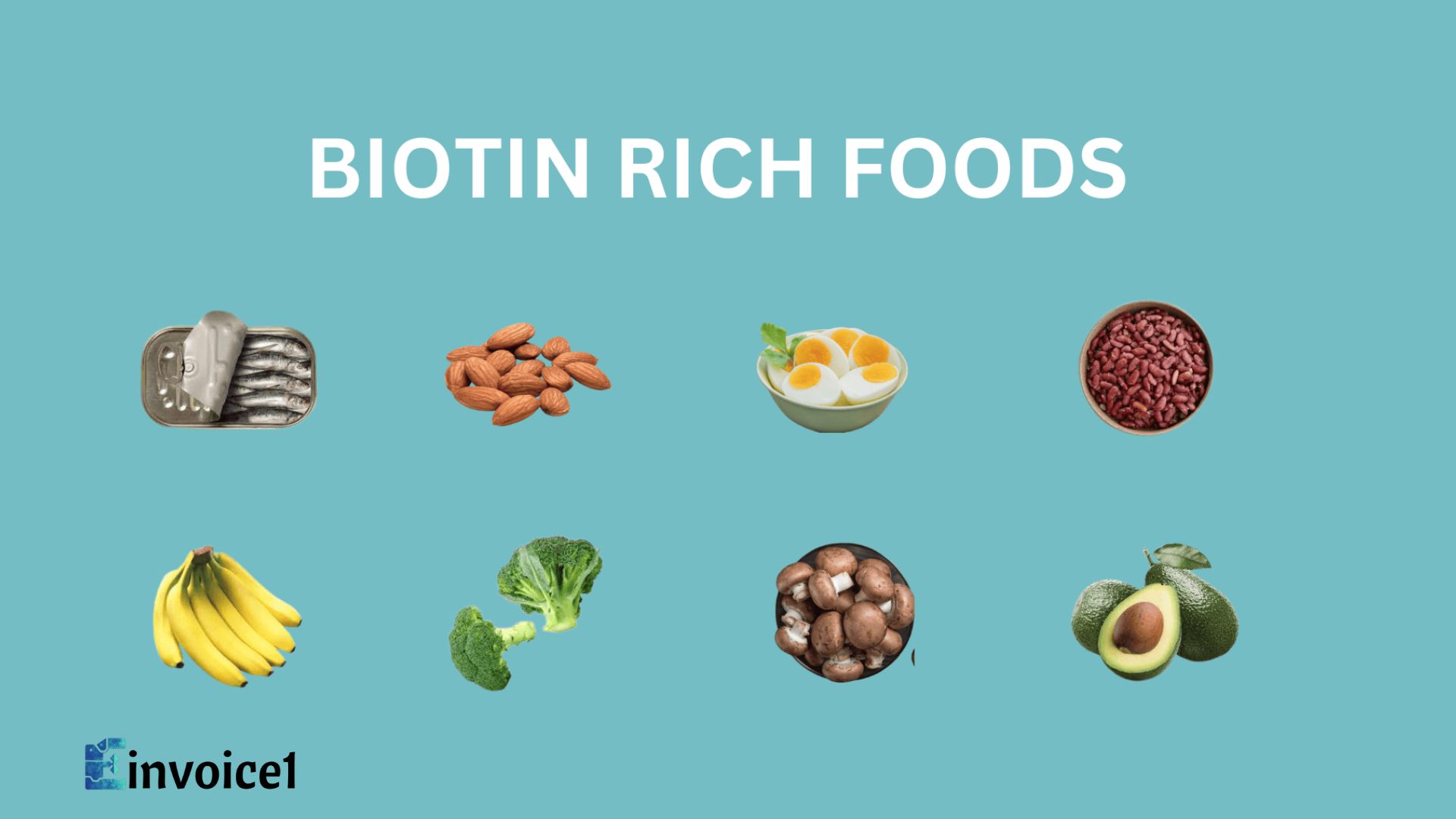In the present world of rush and hurry, more individuals are increasingly conscious of their nutrition and diet. Vitamin K, also known as biotin or vitamin B7, or vitamin H is among the nutrients that often draw a lot of attention because it has a lot of benefits. Water-soluble vitamin assists healthy hair, strong nails, and glowing skin by aiding the body in converting food into energy. Most people are seeking biotin supplements, but lots of foods are rich in biotin, which we can always use in our daily meals. Being aware of high-biotin foods and how to incorporate them into a balanced diet will increase our overall health and prevent deficiencies that may lead to such problems as skin rashes, nail brittle, or poor hair.
What Is Biotin and Why Is It so Important?
Biotin is a B-vitamin that is required to facilitate numerous metabolic processes. It helps break down protein, fats and carbohydrates to enable the body to utilize them as energy. In addition to metabolism, biotin is gaining popularity as a nutrient in the beauty and wellness industry since it is directly associated with strong nails, glowing skin and healthy hair growth.
Even though exact requirements may vary based on age, gender, and medical status, adults are supposed to take between 30 and 100 micrograms of biotin a day. Deficiency is not frequent; however, it might lead to the development of neurological symptoms, brittle nails, loss of hair and exhaustion. One of the safest and most sustainable methods of addressing the needs your body has is including natural foods that are rich in biotin instead of relying on supplements only.
Top Biotin Rich Foods to Include in Your Diet
Eggs – Especially the Yolks: Biotin is abundant in eggs and also a source of nutritional value. It is interesting to observe that the yolk has more biotin than the white. The average egg which is cooked contains around 10 micrograms of biotin, making it convenient and a fairly affordable food.
Due to the presence of a protein known as avidin in raw eggs whites, which binds with biotin and prevents the absorption of the latter, it is important to cook eggs. Besides tasting good, scrambled, boiled or poached eggs are a safe way of getting the health benefits of biotin.
Nuts and Seeds: The best sources of biotin among plants are nuts and seeds. Almonds, walnuts, sunflower seeds, peanuts, pecans are particularly high in this nutrient. As an example, 1/4th cup of roasted almonds can provide approximately 1.5 micrograms of biotin.
These are also filled with healthy fats, protein, and antioxidants, which makes them the best snacks to take up energy and skin health. A few mixed nuts or sprinkling seeds on top of salads and smoothies is an easy method of increasing your biotin.
Legumes – Beans, Lentils, and Peas: Peanuts, soybeans, black beans, lentils, and other legumes are good sources of biotin and protein as well as fiber. As an example, peanuts are not only versatile, but they also contain about 5 micrograms of biotin in a serving.
Legumes are also cost effective and can be incorporated in a variety of meals, both as a soup and stew as well as a salad and spreads. The frequent consumption of legumes is beneficial to the heart, digestion and energy levels and consistent sources of biotin.
Organ Meats – Liver and Kidneys: Organ meats are not the first choice of most people; however, they are one of the richest natural sources of biotin. Beef liver, specifically is a source of this vitamin in large quantities, as it contains over 30 micrograms per serving.
Organ meats in the past were a common staple in most cultures and were reputed to be very high in nutrients. They are nowadays less frequent, yet one of the most concentrated sources of biotin. When added in moderation, liver can be an enormous nutritional contributor.
Fish and Seafood: Some fish including salmon, sardines and tuna contain biotin and also omega-3 fatty acids. Together these nutrients maintain the heart, brain and a shiny skin. Biotin can be found in a 100-gram portion of salmon as about 5 micrograms.
In addition to providing a variety to the diet, seafood is a rather well-rounded source of biotin, as it contains the necessary proteins and minerals.
Dairy Products: Biotin is moderately found in milk, cheese and yogurt and is commonly found in most homes. Calcium, protein and vitamin D are also found in dairy and therefore are useful addition to a balanced diet.
In the case of lactose intolerant patients, lactose-free dairy or fortified plant alternatives also offer the chance to get nourished without problems with the digestive system.
Whole Grains: Oats, barley, and brown rice contain not only a good amount of fiber but are also good sources of biotin as whole grains. The whole grains do not lose the outer layers that are nutrient-rich, unlike refined grains, and that provides biotin.
Small but regular portions of bread biotin can be provided by a bowl of oatmeal in the morning or whole-grain bread midday.
Vegetables – Sweet Potatoes, Spinach, and Broccoli: Sweet potatoes are one of the best sources of biotin among the vegetables. One medium sized sweet potato offers almost 2.5 micrograms. They are also good in beta-carotene, together with biotin, and are beneficial to the eye and immunity.
Biotin is also found in leafy greens such as spinach and cruciferous vegetables such as broccoli, and if one prefers plant-based diets, they are a great addition.
Fruits – Bananas and Avocados: There are lower amounts of biotin in fruits than found in animal products, although some are notable. Especially useful are bananas and avocados. Bananas are a good source of small portions of biotin and potassium and avocados are good sources of healthy fats and 2 micrograms of biotin per serving. Smoothies, salads, or even fresh juicy eating of these fruits can help to increase the flavor and nutrition.
Mushrooms: Mushrooms are a low-profile biotin source, with such types as white button and shiitake mushrooms being good sources. Mushrooms have a high level of biotin compared to many other plants because mushrooms tend to grow in areas where biotin is required to survive. Grilled mushrooms, soups or stir-fried variants can just be included in a biotin-centered diet.
Biotin Rich Foods vs. Supplements – Which Is Better?
Although supplements are convenient, they are not a necessity to most individuals. Whole foods contain not only biotin but a great deal of complementary nutrients in the form of fiber, good fats, and antioxidants that function together to ensure the general well-being.
Supplements can be helpful in the situation of evidence-based deficiency, pregnancy, or some medical issues. However, for the average person, relying on biotin rich foods ensures a more natural, safe, and sustainable approach. In addition, food-based biotin is well-absorbed without the perils of over-absorption.
How to Include Biotin Rich Foods in Your Daily Routine
The most helpful thing to do is to make a balance diet and incorporate in small portions biotin-enriched foods all over the day:
- Breakfast: Oatmeal with bananas, nuts and yogurt.
- Lunch: Whole-grain bread sandwich with avocado and spinach.
- Snack: A handful of roasted almonds or sunflower seeds.
- Dinner: Sweet potato and broccoli grilled salmon.
This way, with such a plan in place, you can readily achieve your biotin needs without overdepending on supplements.
Real-Life Example: The Impact of Biotin-Rich Foods
Take the case of a person with splitting nails and losing hair. They started to use foods such as eggs, almonds, salmon, and avocados as opposed to using supplements as the first choice. Their nails and hair got better with time, and they felt more energized and enjoyed better digestion. Here is where a healthy, balanced diet containing natural sources of biotin can make noticeable changes to health and appearance.
Conclusion
Biotin is an essential nutrient that helps in energy generation, healthy hair, lustrous skin and healthy nails. While deficiencies are rare, regularly including biotin rich foods in your meals ensures that your body functions optimally without the need for excess supplementation. Nature is rich in good stuff because of eggs and nuts, sweet potatoes, and mushrooms. You can easily match your daily biotin intake through the construction of a diet based on animal and plant food sources and also enjoy the other nutrients that are important to your body. Food-based nutrition is always sustainable in the long-term. Hence, whenever you are preparing your meals, make sure to add these natural biotin sources to improve your health, beauty and energy.




